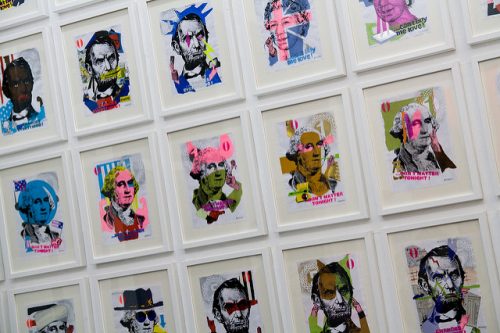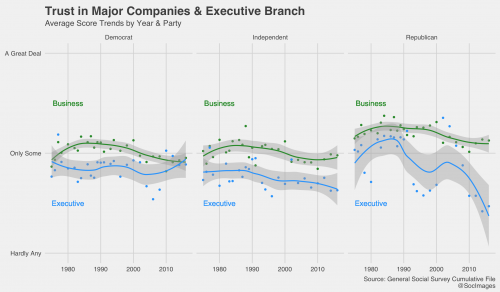As fun as it has been to watch former Starbucks CEO Howard Schultz announce a possible presidential bid and get ratioed on Twitter, his candidacy also says a lot about our deeper assumptions on wealth and politics.

From Citizen’s United to classic sociological works like Who Rules America, we know that wealthy interests have long influenced U.S. politics. This influence doesn’t just happen behind the scenes, though. It also shapes our thinking about who is qualified to run the show. Thorstein Veblen’s “conspicuous consumption” and Max Weber’s “Protestant ethic” both point out the public work that wealth does when people use it as a shortcut to indicate either merit or morals. Candidates like Donald Trump use these assumptions effectively by arguing that business savvy shows their qualification for public service.
Over on Montclair SocioBlog, Jay Livingston took a look at Schultz’s old school language on being a “person of means,” rather than a billionaire. This euphemism was especially interesting to me, because it shows how candidates with wealth also try to have it both ways. Schultz’s implicit argument is not that different from Trump’s: his wealth and business success make him qualified to run on a platform of fiscal responsibility and independence from party ideology. But in a changing political climate where some say “every billionaire is a policy failure,” drawing attention to this wealth can also be a political liability.
So, do people actually trust the rich to govern? A quick look at some survey data suggests there’s a pretty sizable partisan gap here. The American Mosaic Project asks people whether they think others from a variety of social groups share their vision of American society. This general question can tell us a lot about which groups people think are “like them,” a good proxy for trust and tolerance.

In this sample from 2014, Republicans had a higher average affinity with the rich than Democrats. We can also look the question a different way in the General Social Survey, which has been asking people about their trust in the Executive Branch of government and in major corporations for years.

Here again, these trends show elevated trust for in big business among Republicans, along with much more fickle attitudes toward the Executive Branch depending on who is in power. While people tend to trust business more than the government here, these quick snapshots also suggest that stronger trust in business and wealth tacks pretty closely to typical party politics. With more candidates on the left starting to question why we trust the rich to govern, this relationship might get stronger and keep wealthy independent candidates stuck in the middle. Successful business leaders might seem like good candidates for government, but they also need to do their market research first.
Evan Stewart is an assistant professor of sociology at University of Massachusetts Boston. You can follow his work at his website, or on BlueSky.
Comments 36
Johnathan Rosenthal — September 3, 2020
Thanks
Mougne Tous — September 14, 2020
I have to agree with you that a lot involvement of money in the politics is not good in any case. The wealthy interests are negatively impacting the politics of USA for quite a long time. We have to end this culture by spreading awareness therefore I am writing an essay on this with the help of onlin writer by reading edubirdie review from https://essayyoda.com/review-of-edubirdie-com/ source because it shares the authentic and real one.
Hares Werev — October 31, 2020
Good morning everyone or good afternoon. Great bets can be made on the sports betting site every time. But now you can already make great bets on eSports. You can use an excellent site that gives here bet csgo matches all the first players simply huge bonuses and makes it possible to become a very successful person
gustavowoltmann — December 8, 2020
Very interesting information and after read this, I have learned more things. Its can be useful in future. Gustavo Woltmann
David — December 27, 2020
A very interesting article and as a marketer I also learned a lot. I'm in the process of promotion my own site bestessaytyper.com/buy-college-essays-online right, so the information in this blog will be of interest to me! So I wish you good luck!
fff — March 27, 2021
https://thesocietypages.org/
gustavo woltmann — March 27, 2021
i am new
Irene dwards — May 28, 2021
안녕하세요, 이것은 매우 흥미로운 게시물이며 저는 항상 이런 종류의 정보를 읽고 싶습니다. 어린 시절부터 저는 스포츠에 관심이 있었고 모든 게임을하는 것을 좋아하기 때문입니다. 하지만 지금은 온라인 슬롯을 시작할 생각이며 이에 대해 알고 싶습니다. 그래서 저는 https://casinosanalyzer.kr/slots-online/Bubble-Craze 사이트를 따라 갔고 슬롯 정보에 좋을 것입니다. 잠시 후이 웹 사이트에서 슬롯 게임에 대한 더 많은 팁을 배울 것입니다
David Mathews — November 8, 2021
You've provided some excellent information. I was reading a post on spdload.com about web development services for startups and wondered how much it would cost. You can check it out at spdload.com and tell me if it's correct and how much it costs.
Sloboda Studio — December 9, 2021
I think, in general, this is a typical situation when people who have achieved success in business and have capital in one way or another are close to making decisions at the country level. For me, the question has always been how independent they can be. And will they be able to adopt important and necessary laws for the country, and not only for lobbying their own business. By the way, no one has canceled the fact that any business needs to simplify work processes, implement their ideas and develop in general. For this there is [https://sloboda-studio.com/blog/hire-dedicated-development-team/](https://sloboda-studio.com/blog/hire-dedicated-development-team/)
Kean Sargent — December 24, 2021
I totally agree. No one can deny that any company needs to streamline work procedures, incorporate new ideas, and grow in general. So, you should deal with those who can be a good helper in this, namely https://sloboda-studio.com/blog/hire-dedicated-development-team/
Gene Barron — August 10, 2022
This is really exciting and would love to participate soon for mario games
nytimes wordle — September 23, 2022
The style absolutely superb. These types of tiny facts usually are fashioned using lots of story practical knowledge. I'd prefer everthing appreciably nytimes wordle
Theodore Evans — November 10, 2022
This is very interesting information! I've really enjoyed reading your points, and I think you're right about a lot of them. You are an amazing Unbelievable Blog! I should thank you for all the work you put into making this post fnaf
Artel — April 11, 2023
"Successful business leaders might seem like good candidates for government, but they also need to do their market research first." It's a non-debatable statement. The thing is it is also true in any development process you want to talk about. Let's imagine mobile app development. Without a proper discovery phase of a project
(that includes market research as well), it will be impossible to succeed, your app needs to be developed to meet all the requirements and be launched successfully in the app store.
billyoberts — July 6, 2023
Camera Service:
The camera service enables developers to integrate the device's camera functionality into their React Native apps. This service empowers app creators to capture photos and record videos, opening up possibilities for building augmented reality apps, social media applications, and more.
Push Notification Service:
Push notifications play a crucial role in engaging app users and keeping them informed about important updates. react native services provides services that facilitate the integration of push notifications into cross-platform apps, ensuring a consistent user experience across different operating systems.
AIS Technolabs Pvt Ltd — August 25, 2023
As in these article is has been clearly mentioned the age-old connections between wealth and politics. Hire game developers as now in the age of digitalization game development is a good mode of earning, so reach us at https://www.aistechnolabs.com/hire-game-developer/ to gain next-level gaming solutions.
moto x3m — September 20, 2023
Thanks for the useful information from your article moto x3m
Pavingblock99 — January 16, 2024
Terima kasih informasinya.
Paving Jogja — January 16, 2024
Info yang menarik sekali. Paving Jogja
check this blog — April 5, 2024
It is a perfect place for us to find the best details about the “People of Wealth” in Politics and the detail is useful for us for learning. I saw amazing ideas in it that are new for us.
Danyell — April 5, 2024
It is a perfect place for us to find the best details about the “People of Wealth” in Politics and the detail is useful for us for learning. When I used Perth roof and gutter repairs I saw amazing ideas in it that are new for us.
Jack — April 20, 2024
An interesting idea for graphics for a social network. I'm currently studying 2D animation and did graphics for https://bestallgames.com/free_online/chinese-new-year-mahjong/ which I’m quite proud of) I understand that online games are not the most difficult thing for an artist, but I hope that soon I will be able to make graphics for more complex projects.
Hendrix — April 20, 2024
An interesting idea for graphics for a social network. I'm currently studying 2D animation and did graphics for https://bestallgames.com/free_online/chinese-new-year-mahjong/ which I’m quite proud of) I understand that online games are not the most difficult thing for an artist, but I hope that soon I will be able to make graphics for more complex projects.
lolo potter — May 13, 2024
Find the best React JS developers for your project. Build fast and reliable React-powered mobile apps, web applications, and websites.
https://gloriumtech.com
Evans Garcia — May 13, 2024
Your Product. Your Idea. Our Innovation and Engineering
https://gloriumtech.com/
jess chetl — June 19, 2024
Are you one of them? io games
Alex Belov — August 15, 2024
https://thesocietypages.org/ Your email address w
alexbelov11 — November 6, 2024
Playing slots on Winspirit Au Sat also brings a sense of community. The online slot community in Australia is growing fast, and there’s something exciting about knowing you’re part of a larger group of people who love the same things you do. Try https://winspirit-australia.com/. There are leaderboards, chat options, and sometimes even in-game events that make the experience feel social. It's great to see your name climb the leaderboard or just chat with people who have the same interests.
fifiyi5 — November 6, 2024
cool that
Hunderad — November 16, 2024
It looks fancy, I liked it very much, there is useful information here
bloxd io — November 16, 2024
it looks fancy, I liked it very much, there is useful information here.bloxd io
Susan Swift — May 6, 2025
“People of Wealth” in Politics is so nice and when I used treeremovalwollongong.com.au I got the best services with amazing results.
kashif kashif kashif — August 2, 2025
Because of this , advertising campaigns strategies to be able to helpful check out sooner than publishing. Be more successful to jot down far better location such as this. mexican restaurant
Jodi Huerta — September 21, 2025
Read this on a lunch break—solid take. The euphemism stuff tracks; customers only trust me after reviews, photos, and a job done right, not because I say the business is “successful.” Same for politics. For context, I run a small roof outfit in WA: https://roofrestorationperth.co
Jodi Huerta — September 21, 2025
Read this on a lunch break—solid take. The euphemism stuff tracks; customers only trust me after reviews, photos, and a job done right, not because I say the business is “successful.” Same for politics. For context, I run a small roof outfit in WA: https://roofrestorationperth.co